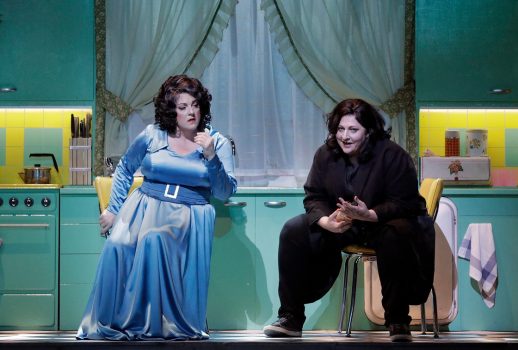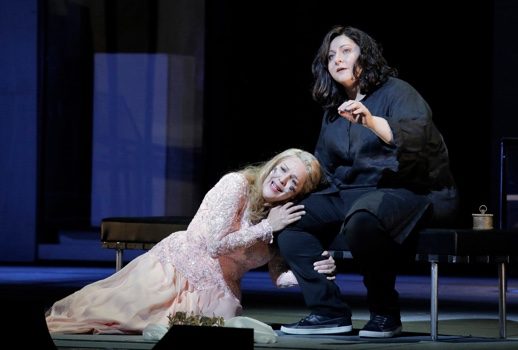

You can pick your family and you can pick your origin, but you can’t pick your family of origin.
Deborah Voigt for a time referred to herself kiddingly-on-the-square as Ariadne Incorporated. When you sing a role particularly well, it may end up dominating your schedule—ask Lise Lindstrom or Latonia Moore, neither of whom had a break for years running from being Turandot Inc. or Aida Inc, respectively. I imagine it to be a secure feeling, but I do wonder if it’s also like knowing you’re going to have the same thing for dinner every night for the next year, except in Christine Goerke’s case, some version of that scenario where dinner is one part triathalon, one part nervous breakdown.
Goerke is singing Elektra this season at SFO, Houston, and the Met. In the last few years, she’s sung it in Chicago, London, Warsaw, and Detroit. If she’s bored or daunted, she isn’t showing it.
It’s a shame there isn’t a special, terrifying arrangement of Cenerentola for dramatic soprano, as Goerke’s story, career-wise, has a touch of Cinderella to it. She’s spoken frankly of the fact that, after a glorious early career singing the bejeezus out of Handel and Gluck, a vocal crisis nearly knocked her out of the singing biz. There is even recorded evidence of it in a broadcast Norma where the inherently interesting color of the voice and the intelligence of her phrasing can’t save it from being somehow just… off.
I heard Goerke as the Foreign Princess in an all-around epic Rusalka a few years after that Norma and felt that tickling on the scalp that means (at the risk of sounding like someone from the Black Lodge) Something Is Happening Or Is About to Happen. It’s not a role in which you can walk off with the show, but it was pretty clear that this was a voice that was about to be important in our listening lives.
Cut to the Met broadcast of Frau Ohne Schatten and hunch confirmed. I couldn’t restrain myself from dropping a note to the facebook-friendly Goerke and saying that I and several people I knew were freaking the fuck out over what she was doing. It still amuses me that she responded during the intermission to say “Thanks!!! We’re having a blast.”
The thing is, you can make a career of Elektra if you can get through the role at all, and as a hardcore Elektraphile, I have mostly spent the years hoping to hear someone do more than survive it. Claudia Cassidy once wrote in the Chicago Tribune, “when Rose Pauly sang Strauss’ Salome or Elektra, you tasted dried blood.” I should perhaps pause for a swig of Listerine before announcing that, based on her performance on September 9 at San Francisco Opera, Goerke has taken her place alongside the great proponents of the role.

Keith Warner’s production, here after a premiere in Prague, is an ambitious mess, but certainly something of a bargain with the four or five different concepts all for the price of one, elbowing each other out of the way every few minutes. You’ve got your “Night in the Museum,”and your “It’s All In Her Head” and your “Pantomimes of Childhood Trauma” and that’s all before halftime.
I’ll admit that the last of those, as designed by Boris Kudlicka, was a bracing image on the stage, but it also kept me looking back and forth between two narrative foci, lessening the impact of both. Warner continuously uses space in ways that keep his characters from interacting, in the first moments of the score going so far as to place the maids offstage, an inexplicable decision from a musical perspective.
I can’t say I wasn’t seduced by some of his stage tableaux and a few real coups de theatre, but the old campfire trick of shining the flashlight up your nose doesn’t really belong in the Classics. It certainly takes some of the punch out of “Was Bluten muss?”—effectively erasing Goerke’s facial expression at a crucial dramatic moment.
Gestures like having Klytamnestra waggle a bottle of brown liquor around on the words “und meine Leber krank ist” don’t win points for insight, and rigging up an onstage beheading is mostly going to win over fans Joan Crawford in her Grande Dame Guignol era. Warner, or perhaps his revival director Anja Kuhnhold, for reasons that are not mine to know, had Adrienne Pieczonka fiddle around with a teddy bear and later had Robert Brubaker put the bear ostentatiously on a chair as he began to disrobe.

Warner and Kuhnhold had greater success with the shaping of individual characters. As partially as Michaela Martens’ unusually lyric reading of Klytamnestra registered—hers was the performance of a lieder singer, lovely but small in scale—her haunted embodiment of the queen as a broken woman will not easily be forgotten.
While Chrysothemis’ place in this version of the story was difficult to get a reading on, it was a serious performance devoid of that character’s often grating presence. Pieczonka filled out the concept with a fine, full sound, musically deployed. The final duet with Goerke was all-guns-ablaze, not to be undone even by her entry a moment later in the closing bookend of the production’s rather pat framing device.
I suppose it’s common sense that the recognition scene is the beating dramatic heart of Hoffmansthal’s Elektra, but I can honestly say I had never until this evening experienced it as much more than a delay before the opera’s big payoff. Head to head with Alfred Walker’s noble, authoritative Orest, Goerke did her most enthralling singing and acting.
The scene was by turns harrowing and rapturous, and it was the finest thing I’ve seen on an operatic stage in recent memory. It was also a rare moment that the Concept of the production gave the singers room to go with their instincts. It was the best of opera, the reason we go to opera in the first place.
Henrik Nanasi, making his company debut, led an emotionally unrestrained reading of the score, admirably flirting with chaos from time to time. The usual cuts were made. Five performances of Elektra remain. It would be a mistake to miss any of them.
Photos: Cory Weaver

























Comments